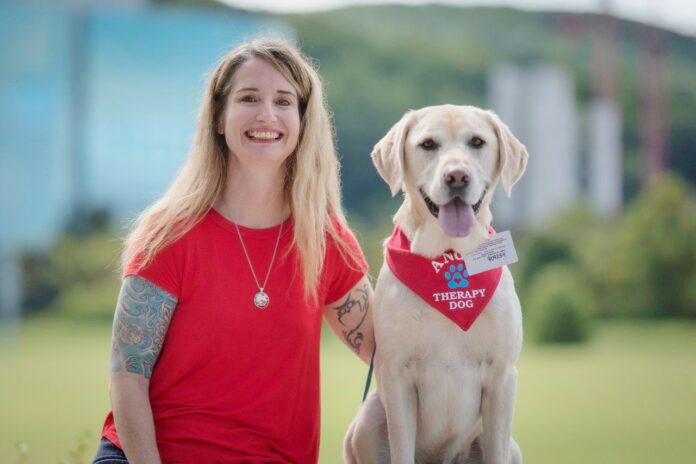Most of Melissa Leaf’s life has revolved around animals. A veterinarian and member of the Class of 2024 at the Virginia Tech Carilion School of Medicine (VTCSOM), Leaf has changed her focus from animal to human medicine and has embraced both the similarities and differences between the two.
“The fundamental physiology is really similar,” she said. “And the medical jargon is usually similar. But because animals walk on all fours, my directional terminology is different, which can sometimes be entertaining.”
What made Leaf decide to add human medicine to her already overflowing skill set?
“Simply put, I wanted to do more,” she said. “There is a lot of euthanasia that happens in veterinary medicine. Sometimes it’s because the animal is old or sick, but sometimes it’s because the owner can’t pay for a life-saving procedure. It becomes soul crushing.”
Leaf earned her Doctor of Veterinary Medicine from North Carolina State University in 2012. Her professional experiences have taken her around the world, from treating dogs with severe parasitic infections in Guam to taking care of bomb-sniffing dogs in the Middle East. She spent two years in the latter position, traveling between Iraq and Afghanistan to provide care for the highly trained canines contracted with the Department of State.
“Anything those dogs needed, they got,” she said. “It was not as grim as you might imagine because they were very good at their job of detecting explosives. For the first time, I didn’t have to talk to anyone about how much the care was going to cost. I simply got to provide the best possible medical treatment. That’s when I realized how hard it would be to come back and practice in the U.S.”
When Leaf entered VTCSOM in 2020, she knew she wanted to remain involved with treating her first love – patients of the furry kind. She balances her time between medical studies and work at Roanoke’s Veterinary Emergency Services, where she provides urgent and emergency veterinary care, diagnostics, procedures, and surgeries.
She also volunteers with the Roanoke Street Dog Coalition, an organization that provides free medical care and related services to pets belonging to people experiencing, or at risk of, homelessness.
“There is usually a powerful emotional bond between these individuals and their pets,” she said. “The coalition is committed to protecting the human-animal bond and caring for the pet and the person. It’s been one of the most rewarding things I’ve been part of.”
As a veterinarian and now medical student, Leaf is increasing her knowledge about translational medicine.
“So much of what we know in human medicine is based, for good or bad, on animal research,” she said. “But sometimes it translates back in the other direction.”
She described a drug called Cerenia that was developed to ease nausea in people undergoing chemotherapy. The drug was shown to help dogs but had a rare side effect in humans, so it came back and became licensed as a veterinary product.
“It’s interesting when these treatments for animals kind of trickle down from the human world.”
More than half way through medical school, Leaf can say with certainty her mid-career change was worth it. She adds that some of the unique features of VTCSOM are an excellent match for her.
“I was intrigued with the idea of this small, research-based medical school with an emphasis on translational medicine. It just seemed like the right place for me to be,” she said.
VTCSOM’s problem-based learning curriculum, in which small student groups study and teach each other based on real patient cases, was enticing.
“Coming back as a nontraditional student, an older student, and one with medical experience, I knew classroom lectures would not work for me,” she said.
One of the most surprising things for Leaf has been the differences between veterinary school and medical school such as the early exposure she and her classmates got by interacting with standardized patients in mock clinical settings. Standardized patients are individuals who are trained to mimic specific illnesses and conditions.
“Within the first month of medical school, they had us interacting with standardized patients. From the very beginning, we are learning how to communicate with them,” Leaf said.
“Another skill we learned was how to set an agenda for the appointment as soon as we stepped through the door to meet with a patient. By setting an agenda, you don’t run out of time, and you’re sure to address what really matters to the patient. I wish someone had taught me that 12 years ago!” she said.
After medical school, Leaf hopes to specialize in anesthesiology and pain management.
“I think anesthesia is the nicest profession because it’s the doctor’s No. 1 job to keep the patient safe and then, to the best of their ability, keep the patient free from pain and anxiety,” Leaf said.
This year, her third of medical school, is spent in clinical rotations. Next year will consist of additional rotations, electives, and applying for residencies. Leaf is on track to graduate in May 2024.
Medical school seems to be an endeavor Leaf is glad she pursued.
“It’s fascinating,” she said. “I’m learning all these things I’ve been curious about. Every day is a brand new experience, and I love it.”

